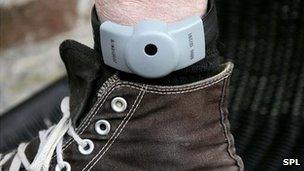Electronic tagging 'changes needed to save money'
- Published
- comments

The report says it is 10 times more expensive per offender to tag in England and Wales than in the US
The system of electronic monitoring of offenders in England and Wales should be changed to save millions of pounds, a think tank has suggested.
Policy Exchange said the current arrangements were too expensive and had failed to cut re-offending.
It says £70m would be saved if tagging were done by police or probation officers instead of private firms.
The government said that from April new contracts for electronic monitoring would represent better value.
The Future of Corrections report said much of the potential benefits of tagging had not been realised.
Electronic monitoring of offenders, which includes ankle tags and satellite technology, is provided by companies G4S and Serco.
The report says almost £70m a year would be freed up if the firms handed over the technology so that police and probation officers could monitor and fit the ankle tags instead.
It said this would then pay for 2,000 probation officers or 1,200 additional police officers to work on offender management.
The report added that officers should also be able to make recommendations to courts and prison governors on who ought to be tagged.
'Victims reassurance'
Policy Exchange said that for each offender, electronic monitoring cost £13.14 per monitored day in England and Wales, while the equivalent in the US was £1.22.
Rory Geoghegan, the report's author, said: "Extending the use of tagging without these reforms will just see millions of pounds wasted and a real opportunity to cut crime missed."
Chris Miller, a former assistant chief constable who spoke for police chiefs on tagging, said: "What we have been given instead is a sclerotic, centrally controlled, top-down system that has enriched two or three large suppliers, that lacks the innovation and flexibility of international comparators, and that fails to demonstrate either that it is value for money or that it does anything to reduce offending."
Justice Secretary Chris Grayling said new guidelines being introduced "call for a smarter, more integrated approach that takes advantage of the latest technology".
"Properly administered, new generation tagging can promote improved behaviour and give victims reassurance," he said.
'Robust alternative'
The critical report comes after G4S was awarded a five-year £13m contract by the Scottish government last week to run hi-tech new tags with GPS technology, giving authorities the ability to continuously track offenders' whereabouts.
Richard Morris, group managing director of G4S Care and Justice Services, said: "The use of electronic monitoring in England and Wales actually saves the taxpayer tens of millions of pounds each year by providing a robust alternative to expensive prison custody for offenders who are deemed suitable for tagging.
"We have also worked closely with the Ministry of Justice over the years to introduce innovations and changes to the original service which have resulted in improved value for money."
G4S monitors more than 50,000 people in more than 15 countries, he added.
Serco said it did not wish to comment.
- Published21 September 2012
- Published14 June 2012